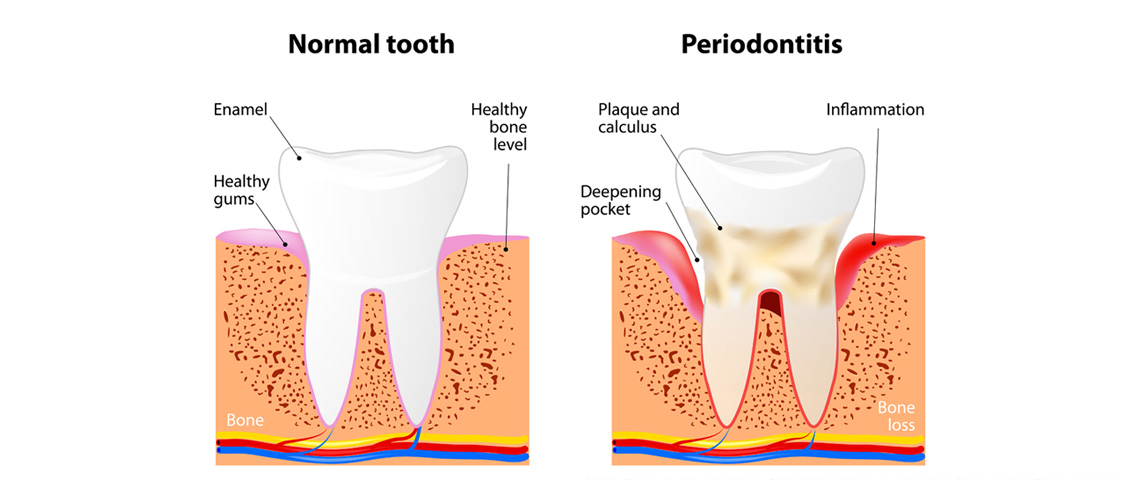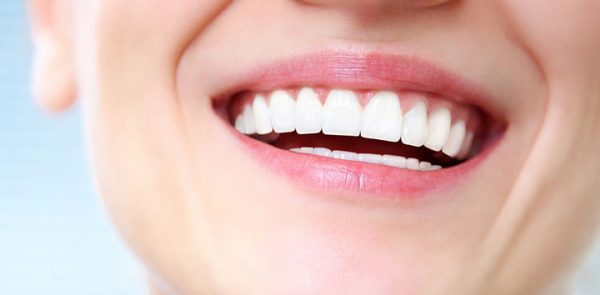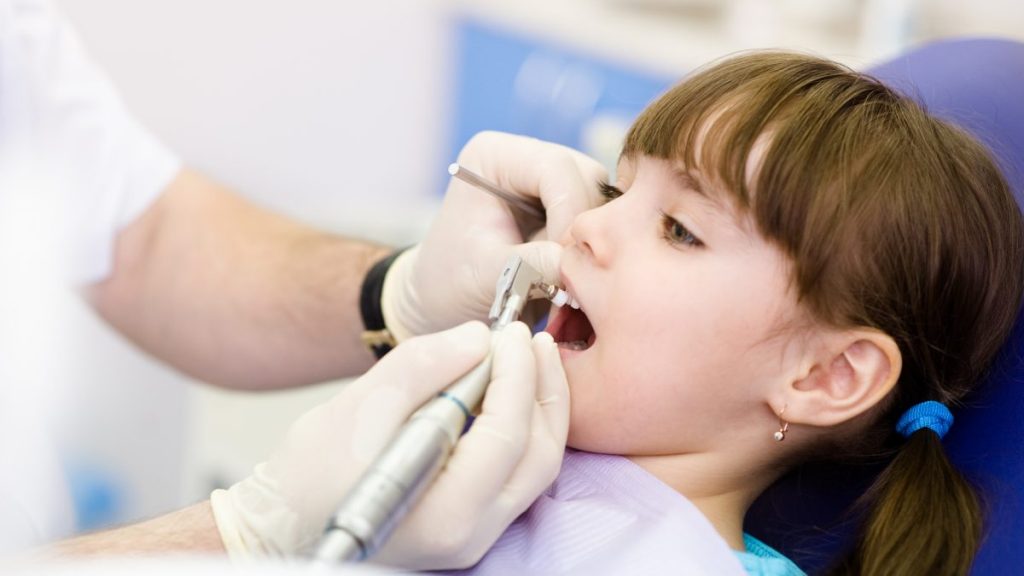Gum Disease Treatment
Periodontal Gum Disease
A range of diseases from gum inflammation to conditions that can damage the soft tissue and bone resulting in the loss of teeth are called periodontal gum disease. They are caused by bacteria, which form plaque, which will turn to tartar unless you clean your teeth properly. Treatments can control the infection, but the patient needs to maintain good daily care.

Importance of Gum Treatment
Healthy gums play a vital role in protecting your teeth from infection, and increasing the chances that you’ll keep your teeth for life. In addition, many studies suggest that healthy gums may lower your risk of suffering serious conditions such as heart disease and stroke.
When your gums are healthy, they form a seal around your teeth that prevents harmful bacteria from attacking the fibres and bones that hold your teeth in place. However, if you have gum disease (or, if we use the proper name, periodontal disease) your gums can become inflamed and swollen, and bleed easily – such as when you brush them.
If the early stages of gum disease aren’t treated, deep pockets can form between the tooth and the gums, which will eventually lead to the tooth becoming loosened due to the damage being caused to the connective tissue and bone. Your gums can recede and your teeth may either fall out or require extraction.
Additionally, when your gums are infected, it’s easier for bacteria in your mouth to enter the bloodstream. Once the bacteria reaches your arteries, it can irritate them in the same way it irritates your gums, possibly hardening the arteries, affecting blood flow or triggering the formation of clots. In turn this could lead to a heart attack or even a stroke.
Clearly, maintaining the health of your gums is vitally important. By doing so you can:
Give your teeth the best environment in which to thrive;
Ensure that your mouth looks and feels healthy; and,
Reduce the whole-body impacts of having harmful bacteria entering your blood stream.
What is the aim of gum disease?
Gum disease refers to a series of problems that occur in the gap between the gum and the tooth. It begins through bacteria, mucus and other particles forming a sticky colourless film on your teeth, which is known as ‘plaque’.
If plaque is not effectively removed through proper daily brushing and flossing, it can harden to form a tartar (or ‘calculus’). Plaque can start turning into tartar after just 26 hours. The problem with tartar is that it can’t be removed through normal brushing. In fact, the presence of tartar makes it harder to brush and floss effectively. As a result, it becomes easier for the acids released by the bacteria in your mouth to begin breaking down the tooth enamel.
However, the most important factor in the ultimate effects of gum disease is the persistent response of your body’s immune system to bacterial plaque. Because the body has been designed to fight infection, it releases chemicals to break down the bacteria. However these chemicals, together with other substances that are released by the bacteria, can ultimately damage the bone and as well as the tissues that keep your teeth in place.
The mildest form of gum disease is known as ‘gingivitis’. The symptoms of this include swollen and inflamed gums, occasional bleeding when brushing your teeth, and some noticeable odours. If left untreated, gingivitis can progress to a more serious form of gum disease call ‘periodontists’, where pockets begin to form between the tooth and the gums. When these pockets are infected by bacteria, the gums may begin to recede, which can result in the teeth becoming loose, falling out or needing to be extracted.
Gum disease often commences in areas of the mouth that are hard to clean, such as your back teeth, along the gum lines, and around fillings or where there’s been other dental work.
What are the risk factors associated with gum disease?
While gum disease usually begins with a failure to maintain good oral hygiene there are some other factors that can affect the health of your gums. These include:
Studies show that older people have the highest prevalence of gum disease. Statistics from the US suggest that more than 70% of Americans aged over 65 have periodontitis.
If you need another reason to quit smoking, try gum disease. Not only has smoking been shown to be one of most significant factors in gum disease, it can also lower the chances of successful treatment.
If you grind your teeth, it can put extra stress and force on your teeth’s supporting tissues, which may increase the speed by which they are weakened by gum disease.
Hormonal changes in girls and women can make the gums more sensitive, which in turn may make it easier for gum disease to develop.
Stress is linked to numerous health problems such as high blood pressure and even cancer. Because stress can make it more difficult for the body to fight infection, it can also slow down the treatment of gum disease. (Your Holistic Dental practitioner can provide you with information about, and referrals to, allied health professionals who can help you find effective ways to deal with your stress.)
Systematic diseases that impair the body’s inflammatory system, such as rheumatoid arthritis, cardiovascular disease, AIDS and some cancers, can also have a negative impact on your gum health.
The health of your mouth can have a big impact on the health of your body, especially if you have diabetes. On the one hand, people with diabetes are more susceptible to gum disease, partly due to the fact that diabetes slows circulation, which means that there is more time for the bacteria to colonise, or take hold. On the other hand, gum disease can make it even more difficult to control diabetes. If you’re a diabetic as well as a smoker, the situation is even worse. Studies show that diabetic smokers aged 45 and over, are 20 times more likely to develop periodontitis than those who don’t smoke.
Reduced saliva production is a side effect of many medications (both prescription and over-the-counter). Without enough saliva, your mouth is more susceptible to infections, including gum disease.I am text block. Click edit button to change this text. Lorem ipsum dolor sit amet, consectetur adipiscing elit. Ut elit tellus, luctus nec ullamcorper mattis, pulvinar dapibus leo.
How is gum disease treated?
When you visit your Holistic Dental practice, the first thing we will do is determine how far your gum disease has progressed. This will include measuring the depth of any pockets between the gums and teeth; checking to see whether teeth are loose or moving; and perhaps taking an X-ray to check that the bone area surrounding each tooth is sound.
If you simply have early stage gingivitis, your Holistic dentist or dental hygienist will:
- Remove the plaque build-up using special dental instruments.
- Conduct ‘scaling’ – which means cleaning the tooth surface from above the gum line and in any shallow pockets that may have formed between the tooth and the gum, carefully and thoroughly removing all plaque and tartar.
Depending on how much scaling needs to be done, you may be given a local anaesthetic. After the treatment, your gums may feel sore for a few days and your teeth may be more sensitive for a period of time.
If you have more advanced gum disease, other treatment may be required such as:
- Root planing – This is a reasonably time consuming process that’s designed to remove toxins and bacteria from the root surfaces of the tooth. In most cases you’ll be given a local anaesthetic for this procedure. You may need to make several visits to your Holistic Dental practitioner, with different areas of the mouth being cleaned each time.
- Filling replacement – If a filling is contributing to the gum disease, this may need to be reshaped or replaced.
- Surgery – If inflammation and deep pockets remain after scaling and planning, you may require ‘flap’ surgery, which involves lifting back the gums to remove the tartar. If you’ve lost gum or bone tissue due to periodontists, your Holistic Dental practitioner may suggest a bone or tissue graft.
Once your gum disease has been treated, your Holistic Dentist or dental hygienist will spend time showing you how to improve your oral hygiene, focusing specially on the best ways to remove plaque through better brushing and cleaning between your teeth.
Best Ways to Keep your Gums Healthy?
At Holistic Dental, we understand that your mouth is the pathway to the rest of your body. Maintaining good oral health isn’t simply important for your teeth and mouth, it’s also vital to your overall well-being.
Healthy gums require a healthy mouth. To achieve this, you should do the following:
- Brush your teeth thoroughly twice a day and floss regularly.
- Rinse your mouth with water or a mouth wash after every meal. (This can reduce bacteria by up to 30%.)
- Eat a well-balanced diet including fibre-rich fresh fruits and vegetables. Reduce the amount of sugar foods you eat, and opt for snacks and drinks that are sugar free. As most packaged fruit juice has a high concentration of sugar, milk or water are better drink alternatives for children.
- Quit smoking, if you’re a smoker.
- Check your mouth regularly for any early signs of gum disease.
- Visit your local Holistic Dental practice at least twice a year for a check-up and through clean.




















